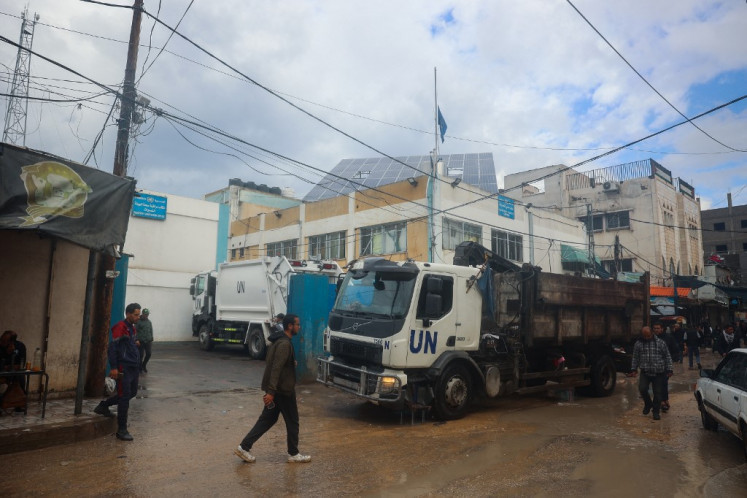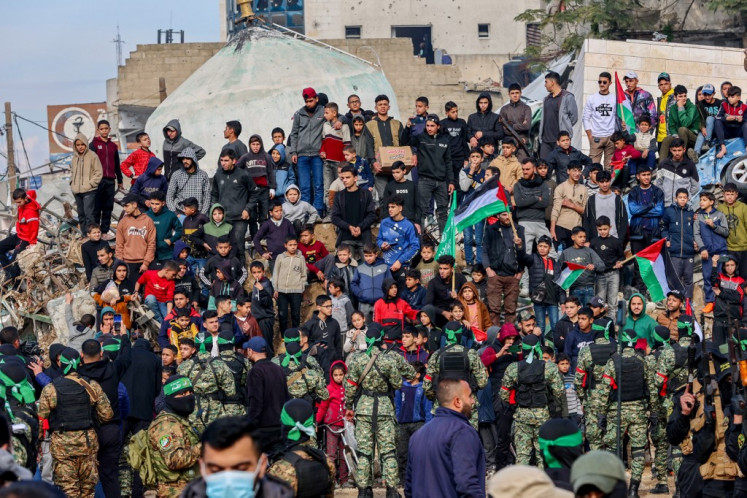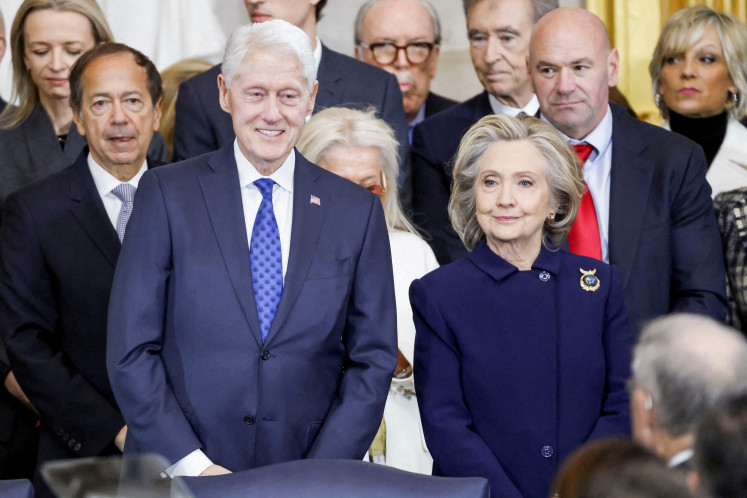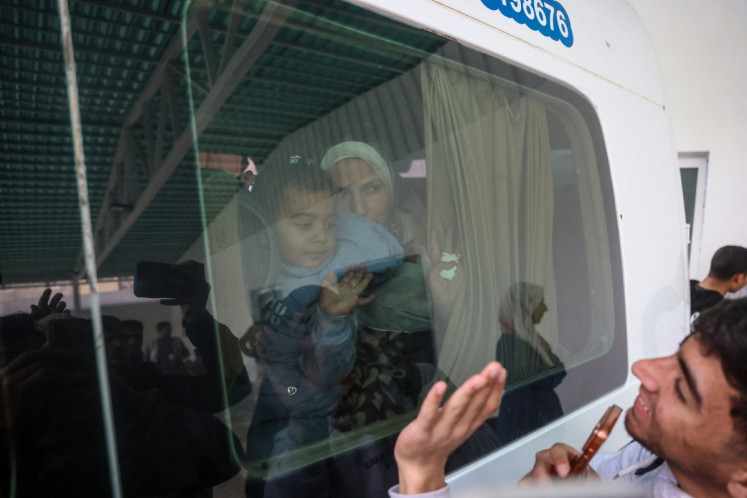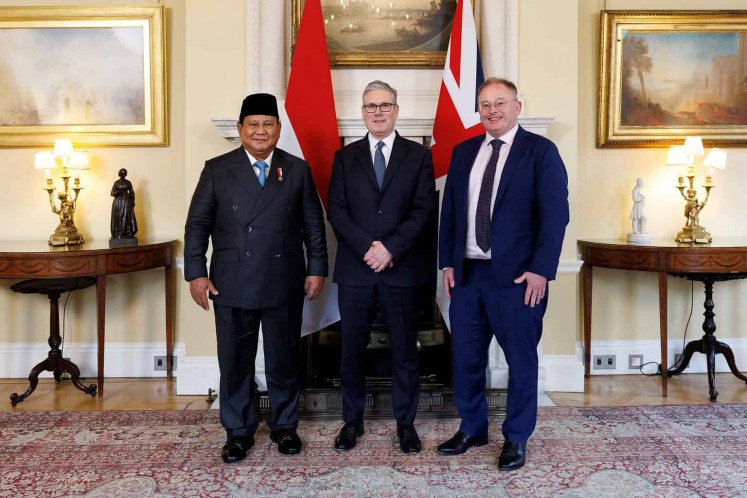Popular Reads
Top Results
Can't find what you're looking for?
View all search resultsPopular Reads
Top Results
Can't find what you're looking for?
View all search resultsHamas, Israel in new hostage-prisoner swap under Gaza truce
The hostage-prisoner exchange is part of a fragile ceasefire agreement between Israel and Hamas that took effect last Sunday, and which is intended to pave the way to a permanent end to the war.
Change text size
Gift Premium Articles
to Anyone
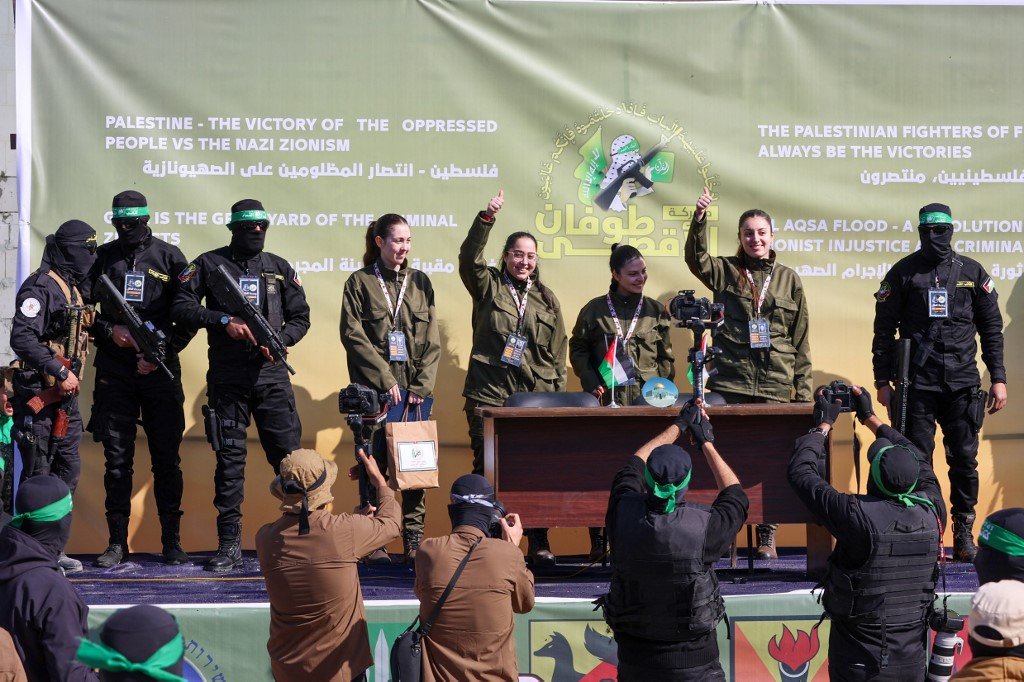 Hamas fighters escort four Israeli hostages, (center, from left to right) Naama Levy, Liri Albag, Daniella Gilboa and Karina Ariev, on a stage before handing them over to a team from the Red Cross in Gaza City on Jan. 25, 2025. Four freed Israeli women hostages were home in Israel Jan. 25, ending more than 15 months of captivity after Hamas militants handed them over to the Red Cross under a truce deal in the Gaza war. (AFP/Omar Al-Qattaa)
Hamas fighters escort four Israeli hostages, (center, from left to right) Naama Levy, Liri Albag, Daniella Gilboa and Karina Ariev, on a stage before handing them over to a team from the Red Cross in Gaza City on Jan. 25, 2025. Four freed Israeli women hostages were home in Israel Jan. 25, ending more than 15 months of captivity after Hamas militants handed them over to the Red Cross under a truce deal in the Gaza war. (AFP/Omar Al-Qattaa)
P
alestinian militants and Israel carried out a hostage-prisoner swap on Saturday under a Gaza ceasefire deal, but a last-minute dispute blocked the expected return of hundreds of thousands of Palestinians to devastated northern Gaza.
As part of the exchange, the second since the truce took effect last Sunday, four freed Israeli women hostages, all soldiers, arrived home in Israel after more than 15 months of captivity in Gaza.
In exchange, Israel's prison service confirmed that 200 prisoners, whom it called "terrorists", were freed.
The Israeli captives, Karina Ariev, Daniella Gilboa and Naama Levy, all aged 20, and Liri Albag, 19, waved, smiled, and gave thumbs up as they were paraded on a stage in Gaza City. Masked and armed militants flanked them during a slick ceremony watched by hundreds of residents.
In Tel Aviv, where a crowd gathered to watch their release on a large TV screen at a plaza known as Hostage Square, there were tears of joy, applause and a loud cheer as Israeli flags waved.
After their handover to the Red Cross, Israel's military said the women were transferred back into Israel and "reunited with their parents".
They were later taken by military helicopter to the Rabin Medical Centre, where they would receive "comprehensive medical care, including psychological support", according to Israel's health ministry.
Buses carrying the released Palestinians left Ofer prison in the occupied West Bank and Ktziot prison in the Negev desert.
As dozens of the former prisoners reached the West Bank city of Ramallah, crowds of Palestinians erupted in joy, raising many of them onto their shoulders, an AFP journalist said.
The Palestinian Prisoners Club advocacy group said among those to be released was Mohammed al-Tous, 69, who has spent the longest continuous period in Israeli detention.
Aid surge
Bassem Naim of the Hamas political bureau had told AFP on Friday that Palestinians displaced by the war to southern Gaza should have been able to begin returning to the north following Saturday's releases.
But Israel on Saturday said it would block such returns until civilian woman hostage Arbel Yehud is released.
Prime Minister Benjamin Netanyahu's office said she "was supposed to be released today" but a Hamas source told AFP Yehud will be "released as part of the third swap set for next Saturday".
On social media platform X, the military's Arabic-language spokesman, Avichay Adraee, reiterated that Gazans were not allowed to approach the Netzarim corridor through which they have to pass to reach their homes in the north.
The truce has brought a surge of food, fuel, medical and other aid into rubble-strewn Gaza, but Israel's UN ambassador on Friday confirmed that the United Nations agency for Palestinian refugees, Gaza's main aid agency, must end all operations in Israel by Thursday.
Palestinians walk in front of an UN Relief and Works Agency for Palestinian Refugees (UNRWA) office in Bureij in the central Gaza Strip on Jan. 23, 2025, days into a ceasefire deal in the war between Israel and the Palestinian Hamas movement. (AFP/Eyad Baba)The hostage-prisoner exchange is part of a fragile ceasefire agreement between Israel and Hamas that took effect last Sunday, and which is intended to pave the way to a permanent end to the war.
Mediators Qatar and the United States announced the agreement days ahead of President Donald Trump's inauguration. Trump has since claimed credit for securing the deal after months of fruitless negotiations.
The ceasefire agreement should be implemented in three phases, but the last two stages have not yet been finalised.
Deported
During the first, 42-day phase, 33 hostages Israel believes are still alive should be freed in staggered releases in exchange for around 1,900 Palestinians held in Israeli jails.
Three women hostages returned home on the first day of the truce in exchange for 90 Palestinians.
Among the overall group of Palestinians to be freed, more than 230 are serving life sentences for deadly attacks on Israelis and will be permanently expelled, according to a list made public by Israeli authorities.
State-linked Egyptian media on Saturday said 70 freed Palestinian prisoners "deported" by Israel had arrived in Egypt by bus. They were to transit and go on to third countries.
Gazans gather in a square as Hamas fighters secure the area before releasing four Israeli hostages to a Red Cross team in Gaza City on Jan. 25, 2025. (AFP/Omar Al-Qattaa)The deal's second phase is to see negotiations for a more permanent end to the war, but analysts have warned it risks collapsing because of the deal's multi-phase nature and deep distrust between Israel and Hamas.
During their Oct. 7, 2023 attack that began the war, Hamas militants took 251 hostages, 87 of whom remain in Gaza, including 34 the Israeli military has confirmed are dead.
The attack resulted in the deaths of 1,210 people, mostly civilians, according to an AFP tally based on official Israeli figures.
Israel's retaliatory offensive has killed at least 47,283 people in Gaza, a majority civilians, according to the Hamas-run territory's health ministry.

